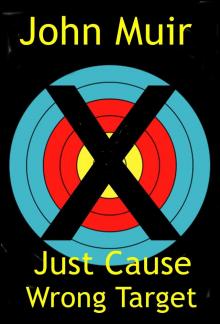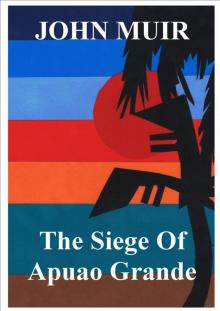The Siege Of Apuao Grande Read online
THE SIEGE OF APUAO GRANDE
John Muir
Copyright © John Robert Muir 2007. John Robert Muir asserts the legal and moral rights to be identified as the author of this work.
All rights reserved. No part of this publication may be reproduced, stored in a retrieval system or transmitted in any form or by any means, electronic, mechanical, photocopying, recording or otherwise, without the prior written consent and permission of the publisher.
DISCLAIMER:
These stories are works of fiction. The names and characters are from the imagination of the author and any resemblance to any persons, living or dead is entirely coincidental. If you think the author has written about you, your ego is greater than your imagination or common sense.
Thank you for downloading this ebook. It remains the copyrighted property of the author, and may not be reproduced, copied, and distributed for commercial or non-commercial purposes. This ebook is licensed for your personal ernjoyment only. This ebook may not be resold or given away to other people. If you would like to share this book with another person, please purchase an additional copy for each recipient. If you are reading this book and did not purchase it, or it was not purchased for your use only, then please return it to your favourite retailer and purchase your own copy. Thank you for respecting the hard work of this author.
Acknowledgements: The author and publisher wish to thank the many individuals for ideas, editing, encouragement and support.
Published in EBooks 2013
EBooks ISBN: 9781310896767
THE SIEGE OF APUAO GRANDE
CHAPTER 1
DEBT COLLECTORS
DAET, CAMARINES NORTE, PHILIPPINES, Sunday night, August.
Private Alcorin would obey the orders of his captain and sergeant to the letter, even though this was no official army mission.
He slowed the jeepney to less than a walking pace and steered a 45 degree angle toward the curb on his right. When he felt the right front wheel touch, he gunned the engine. As the first wheel bounced up the curb he heard the bumps of lurching bodies and stifled curses from his three passengers hidden in the rear.
The sounds repeated three more times as he jumped the other wheels up the curb and onto the footpath. He had positioned the jeepney exactly where ordered; side on, it straddled the corner opposite the Spanish style archway doors of the Los Alamos restaurant. His left side driver's seat was barely 50 metres from the restaurant entry. If the double doors had been open he could probably have seen some of the patrons.
Anyone watching would suspect a driver had arrived to collect his patron from the restaurant and parked on the footpath to wait. Parking at this normally very busy main road intersection would be impossible. But at fifteen minutes to midnight on a Sunday night, there were no pedestrians on that side of the road to argue the point.
Though the street light was feeble, he turned his baseball cap around to shade his face instead of his nape. Donning the full face mask would come later. That was at the ready under his left leg.
With only two cigarettes left from the four sticks bought that morning, he carefully drew one from his intentionally darkly soiled barong pocket; then pulled a box of matches from his jungle camouflage trousers. Using his open palm to hide the flare of the light, he struck a match. His sergeant and the other two members of the platoon hidden in the back of the jeepney should excuse him for this pre-action relaxation.
Joining the army soon after his 19th birthday, Alcorin was a veteran of more than three dozen jungle missions. Genuine contact with the NPA had been made twice, though contrived official reports showed he had been involved in eight contacts; and, as usual, such contacts resulted in considerable losses of equipment and large amounts of ammunition expended.
Tonight's was his second unofficial urban mission. This one, like the previous, would never appear in army records.
He settled back as though waiting for a patron to emerge from the restaurant. His unseen right hand reached out for the stock of his army issue M16A2 rifle sitting on the passenger seat. He pulled it to a handier position on his lap.
----------
Sergeant de Mesa frowned under his full face mask when he saw the flash of the struck match. His annoyance was already heightened by the bumps of the jeepney mounting the footpath. Reprimanding the youngster could wait for later when they returned to barracks. The sergeant knew any sudden flare of light, no matter how minuscule, could still attract the attention of alert watchers.
With him in the back of the jeepney, hidden by the canvas drops over the sides of the window, were two other seasoned campaigners. Their dark loose fitting clothing gave no clue of their army rank or occupation. They all knew this was not an army mission.
The sergeant unzipped the sports bag and pulled out the M72 LAW (Light Anti-tank Weapon). In its pre-cocked state it was 24 inches long, made of two tubes, one inside the other. The smaller tube housed a 66-mm rocket-shaped charge. The garrison had been issued with several to field test in jungle conditions. He 'miscounted' one when supplies were delivered to the armoury.
Checking his watch, it was ten minutes to midnight. Ten minutes to the planned operation start time. Waiting for action to start in the city made him nervous. The rain forest was different. There he would listen to nature's sounds for changes. Here, sound could start suddenly and unexpectedly; the roar of a motor-bike, a car horn, an outburst of laughter. He preferred the jungle.
Slowly he rolled up the left side tarpaulin just enough to see out. He was surprised how well lit the inside of the restaurant was for this hour on a Sunday. It suggested quite a few customers were still inside. Of more concern was the large number of people hovering near the doorway. Most would be stand-by people hoping for a handout from the wealthy patrons as they emerged. Others would be drivers for some of the affluent clientele. Even allowing for that, the number was much larger than expected.
The one floor of offices above the restaurant was dark. No late night office workers inside who could be injured.
Curtains covered the windows of the restaurant preventing him estimating how many occupants were inside. It mattered little to him how many would die. The New Peoples Army (NPA), the military wing of the Communist Party of the Philippines (CPP), would get the official blame for all the deaths. The Daet army garrison's case to the Government for more weapons would be strengthened, and local businessmen would get the message to pay protection money to the army rather than get put out of business in such a manner.
His group's task was to give rapid M16 covering fire, then finish with his anti-tank weapon. He nodded to one of his colleagues who rolled up the canvas behind him to allow for the back blast. The other soldier in his black shirt watched as the sergeant pulled the inner tube back and knew it was locked as soon as the sight popped up and the cocked trigger protruded. The weapon was now 35 inches long.
He laid the tube on his shoulder and nodded in the direction of the restaurant. The black-shirt fully raised the tarpaulin facing the restaurant, and tied it. Darkness and shadow prevented them being seen.
The M72's maximum range was 900 metres against soft targets, but best suited for use up to 200 metres. Firing at only 50 metres, the sergeant did not know how big the explosion would be. It was meant to be good against well-built enemy bunkers. At this range it was more than adequate.
Black-shirt had instructions to jump out of the jeepney as soon as he fired and recover any evidence of any back blast. No evidence of the army's involvement was to be left behind.
He checked his watch again. Five minutes to midnight. De Mesa crouched. He was ready. His captain's arrival and opening shots would signal the beginning of the operation.
----------
Capt
ain Amadeo Rosales sat silent as a passenger in his jeepney during the roundabout route from the army barracks to the new restaurant. He was deep in thought over the events of the past few days. Recent transfer and promotion lists showed he had been passed over yet again. It was over 20 years since he had joined the Armed Forces of the Philippines (AFP). To get the promotion to captain, he had accepted a transfer to Daet, in the Province of Camarines Norte. That was 10 years ago. Despite his requests for transfers out, he was still in Daet, and still a captain.
His sergeant for the past eight of those 10 years was Sergeant de Mesa. He too was stuck in this backwater posting. Rosales knew the sergeant was loyal to him, and with his share in the spoils, kept his mouth shut.
Though Captain Rosales was 39 years old and still unmarried, he had never suffered from a shortage of female companionship. But it was not cheap. He had become accustomed to a reasonable lifestyle, above the salary level of a captain. At his rank, he knew the retirement pension was not enough to support the life he had become accustomed to, wanted in retirement, and felt he had earned. His current lifestyle was still restrictive as his accomodation was limited to army bases. There were none of the luxuries many of his senior colleagues were already enjoying. So, just as many of them were doing, he was using his position to invest in his future.
Some of the levies he charged local businesses and landowners for added protection against possible raids by the NPA had fallen a long time past payment date. Captain Rosales, his sergeant and a few loyal privates had to remind the non-payers of their obligations occasionally. Another reminder was necessary now.
In the past couple of months, the resistance of a few to paying his levies had grown to reluctance among many. They knew the protection they paid for was a veneer to subsidise the soldiers' mediocre salaries. Not all the soldiers benefited and those paying the levies also knew this. Captain Rosales kept the fruits of the extra benefits for himself and his few loyal subordinates.
In addition to the money raised from the levies, Rosales made occasional sales to arms dealers. The weapons came from the well stocked garrison armoury, or his secret stock of weapons and ammunition recorded as lost or expended on missions. The government did not question the large allocation and loss of arms. The NPA had always been very active in the area. Such losses of weapons by the army during the many operational search and destroy missions was therefore not unexpected.
Tactics to contain the urban guerillas were different. Raiders simply emerged from their homes rather than the rain forests; then vanished back into the same squalid huts. Pressure had to be continually applied on the people by the Armed Forces of the Philippines (AFP) to get information about the urban guerillas. It made the AFP unpopular, but it was the only way they could get any intelligence reports.
Jungle-based NPA camps were clearer targets to hit. Mistakes made in the jungle could be left there. Witnesses to those mistakes were easily disposed of. In the townships, it was difficult to silence whole suburbs.
Rosales enjoyed the jungle campaigns. It meant he could write off bigger equipment losses. Still, the best regular income was this protection money.
His senior officer would go along with whatever happened in any reported actions against rebels as it strengthened his position.
Much of the replacement equipment assigned to Rosales' battalion was being diverted before it arrived, hoarded by more senior officers and sold to their overseas buyers. His share was constantly diminishing.
The five jeepneys being used for this raid had been used before in similar raids. The twenty men helping him this time had also been on other raids. They knew their rewards would come later. Only the jeepneys, the raiders' peasant disguises and balaclava-style masks were not from barrack stores. All the weapons and ammunition were from the armoury.
The targeted restaurant occupied a prime site on an intersection in the main street. It was the first major construction in the town for several years. The sophisticated Spanish style arch was set slightly back from the corner to welcome its customers from two streets. The surrounding buildings were old single or two-storey constructions, mostly of aged tinder-dry wooden planks or plywood.
When his driver pulled into the curb about 50 metres south of the restaurant, the captain's mind snapped back to the present task. He noticed with satisfaction that the sergeant's jeepney was already in position. Three more jeepneys pulled into the curb in their assigned positions.
Rosales was also surprised by the amount of the lighting inside the restaurant and at the number of stand-bys hovering around outside. Though he expected they would scatter quickly when he attacked.
The plan was to spray the restaurant windows with machine gun fire to break them, and follow that by tossing in grenades. Charging to the entrance, they would make a short burst of rapid fire through the entry arch for effect. Then retreat rapidly to safety before Sergeant de Mesa administered the coup de grace with his acquired toy.
The captain glanced at his watch. It was right on midnight. All four passengers in his jeepney quietly dismounted. The three other jeepneys also disgorged their men while those in de Mesa's jeepney made ready to provide covering fire.
The walkers converged on the restaurant at a slow pace, cradling readied M16A2's. About 40 metres from the restaurant, Captain Rosales noted the stand-bys outside the restaurant seemed to become agitated at their approach. Perhaps they had noticed his groups were carrying weapons.
He noticed one stand-by, then another, pull out side arms from under their barongs. One of his men also noticed and reacted immediately, running forward and firing from the hip. His shots, sprayed low, kicked up asphalt and gravel from the road. All four groups increased pace, firing on the run. Those standing outside the restaurant were all brandishing a variety of weapons and firing back. The shooting of the stand-bys, from their standing positions, was more accurate than that of the running soldiers. Two soldiers in front of the captain were hit and fell. He felt a stinging sensation on his cheek but kept running forward and firing from the waist.
The combined automatic fire of the disguised soldiers from four different directions and de Mesa's men was beginning to take its toll on the twenty or so defenders. Although the defenders numbers were rapidly falling, Rosales did not know how badly his other three groups were suffering. By the time he had got to within fifteen metres of the door, he was the only one still standing from his group.
He dived to the ground and began to rake the four surviving defenders with a wide sweep of automatic fire. All four went down. He regained his feet and changed to a fully loaded magazine. The groups from the other jeepneys now joined him. Just as he began taking a quick count of his standing soldiers, bursts of automatic fire came forth from inside the doorway. One man each side of him collapsed onto the dirty road. From a crouch, he and his remaining men fired back through the archway at the gun flashes from the now darkened interior of the restaurant.
The unexpected opposition had thrown his plan awry. Survival instincts had meant everyone had been firing at the armed stand-bys. No-one had fired at the restaurant windows and tossed grenades.
The street lights and advertising neon made his group highly visible, while the targets inside were hidden. Firing from within was getting heavier with every second that passed. Rosales began wondering what he had walked into. He reached into his loose shirt pocket for his grenades. Someone else had again beaten him to the punch and the first of the grenades exploded inside the doorway. Then grenade after grenade exploded to light up the restaurant for what seemed forever. Somehow he had managed to see through the series of explosions. It certainly stopped the return fire. He quickly glanced around and noticed only six of his men still taking an active part.
He then remembered Sergeant De Mesa and realised he was too close to the entry for the Sergeant to continue giving covering fire or unleash his rocket.
"Withdraw," he screamed and turned to begin his run back toward his jeepney. After covering about 20 metre
s, he stopped and turned toward de Mesa's jeepney and waved his arms as the signal for him to fire. He flashed a quick glance back at the restaurant archway and the devastation in front of it. Then he saw his other surviving members trying to drag their injured and dead colleagues away from the restaurant to safety. In leaving his men behind, he had not acted like an officer. He also knew that de Mesa would fire exactly twenty seconds after he gave his waved signal. If nothing else, Sergeant de Mesa obeyed his orders to the letter. Rosales thought if he went back to pick up one of his men, de Mesa would hold his fire for a few extra seconds.
He could not leave his men there. As soon as the bodies were identified it would all be traced back to him anyway. He had to get them all away. Dropping his M16, he ran back to the restaurant entry. He crouched over the first man he came to. The now unmasked head revealed a bloodied face with eyes that still registered his movements as he approached. He saw the mouth open.
"I knew you'd come back Captain," uttered the weak voice.
As he put his arm under the neck of the bloodied soldier, he felt or sensed a whoosh pass over his head. A loud crashing sound in the entry doorway seemed to continue onwards and deeper inside. A blinding flash caused his eyes to burn as he felt himself being lifted upward and away from the restaurant. Sharp pain and heat shot through his body as he waited for the fall to come. When it did, he felt no pain at all. He was aware of brightness all around him. Perhaps it was day. Perhaps he had been knocked unconscious or fallen asleep and woken up the next day. Perhaps his mother had turned on the light again when he was having one of those horrible nightmares he used to have as a child about being burned alive. But there was no pain.
Captain Rosales had died, along with 15 other members of their group.
----------
As Sergeant de Mesa’s jeepney rapidly pulled away, he was wondering how he could report this action to the camp commander. Maybe he should have disobeyed the order to fire, but he was so busy concentrating on the sight of the M72 LAW that he did not see the attempts to retrieve the casualties at the front of the restaurant.
Even if he had, he had still been given the order to fire. As a sergeant he was paid to obey orders, not to think for himself.
What had gone wrong? Why were there so many armed men at the restaurant? There were too many questions for him to cope with. It could be the end of his career. Even worse, his superiors might summarily execute him and blame that on the NPA too. Maybe he should just say he was ordered to take part in a covert operation being conducted by Captain Rosales and he did not know what the action was about.
“Yes”, he decided, “that was the safest.” After all he was merely following orders. He would have to convince the other three survivors in his jeepney to plead likewise and he hoped they would all be safe.

 Just Cause Wrong Target
Just Cause Wrong Target Short Shorts & Longer Tales
Short Shorts & Longer Tales A Sunday Market Seller
A Sunday Market Seller The Siege Of Apuao Grande
The Siege Of Apuao Grande Poems, Prose & Penniless Vol 1.
Poems, Prose & Penniless Vol 1. My First Summer in the Sierra
My First Summer in the Sierra